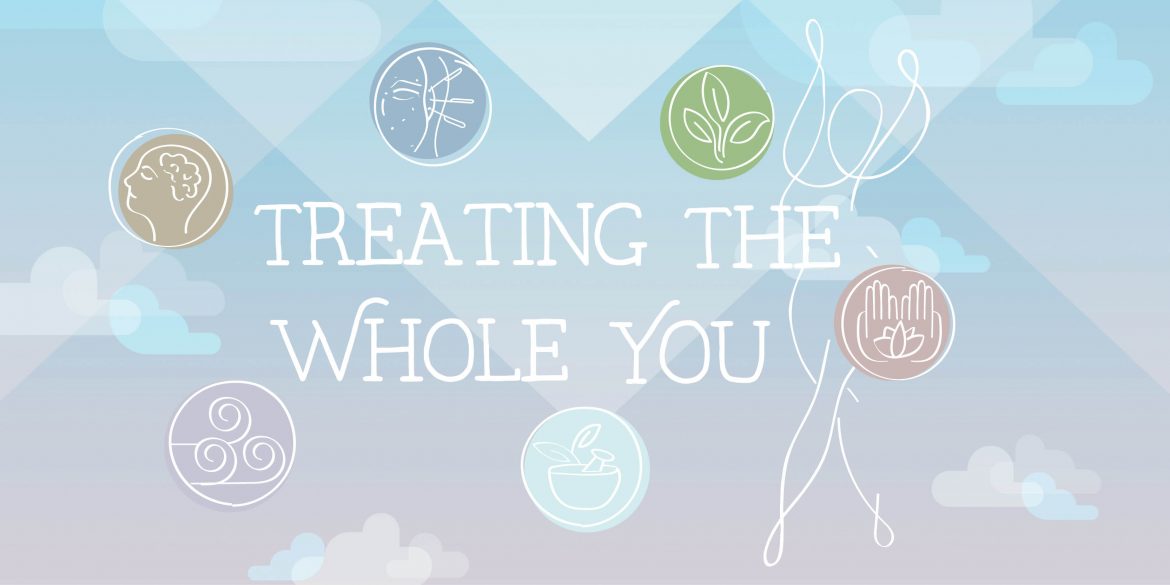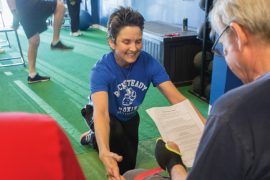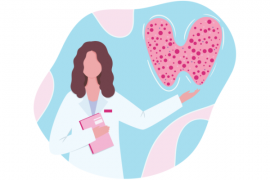By Emily McCluhan
Self-care is certainly a buzzword right now, and we’re incredibly aware of how crucial it is to our overall health picture. In addition to self-care, more natural, holistic ways of taking care of ourselves —— things like meditation, adaptogenic herbs and eating for mood (the gut-mind connection) —— aren’t fringe topics anymore. Seeking ways to take better care of yourself with complementary medicine might be another way to take charge of your health.
Complementary medicine refers to a range of therapies, such as acupuncture and massage therapy, that complement traditional medical therapies. It shouldn’t be confused with alternative medicine, which is the idea of replacing a standard medical approach with a natural or holistic method. Complementary medicine services might even be offered through your health insurance plan.
We explored a few complementary services to understand how they can enhance the standard, compartmentalized approach we’re used to —— a primary care doctor supported by specialists for different conditions and systems of the body —— and tunes our bodies into the energy and environment around us to promote healing.
Acupuncture
For some, the idea of voluntarily inserting needles into the skin is cringe- worthy, yet the practice of acupuncture has been around for thousands of years as part of many types of traditional East Asian medicine.
Acupuncture is based on the idea that more than 2,000 acupuncture or pressure points connect the various pathways or meridians in the body, like the organs, skin, muscles and lymphatic system. When the energy flow along these channels is out of balance or obstructed, issues may arise, such as irritable bowel syndrome, hormone imbalances or even pain. These are the most common reasons patients come in to see her, says Kathryn Coppola, a licensed acupuncturist and owner of Wild Blossom Acupuncture & Wellness.
At a patient’s first visit, Coppola seeks out the root of a patient’s issue by learning their full health history. Often that root cause is affecting other channels in the body, creating a web. By releasing or unblocking those other channels, the main issue can be addressed.
“If someone comes to me with neck pain, I might press on a specific point on the hand for example, and ask her to turn her head,” Coppola says. “If the pain is still there, I’ll find another pressure point and press there. When she turns her head again, the pain may be lessened, and that’s how I know where to focus my attention ——it’s all connected.”
But what about those needles?
“I sometimes call it a ‘tap’ instead of a needle,” explains Coppola. “The majority of the time, patients don’t feel anything, but some do. It may feel like a mosquito bite, but I adjust the tap if they feel anything. Most people feel a deep state of relaxation afterward.”
Coppola explains that acupuncture also pairs well with chiropractic, massage therapy and physical therapy. “For example, someone seeing a physical therapist will get more out of that therapy if they are also doing acupuncture,” notes Coppola.
Acupuncture has been scientifically proven to release endorphins, our natural pain killers, and serotonin, the “feel good” chemical. As these chemicals are released the muscles and nervous system are able to heal more easily. Acupuncture has also been used to complement cancer treatments to help relieve nausea.
However, it’s a good idea to talk with your doctor before exploring acupuncture, especially for those who are at risk for infections, have chronic skin issues or are pregnant.
What drew Coppola to acupuncture was the benefits it brings as a preventive approach to health.
“Instead of using acupuncture as a last resort to try and fix something, try incorporating it to maintain balance,” she says, and suggests exploring maintenance treatments once per month to stay on top of the disruption that stress and anxiety bring, or those nagging aches and pains.
Herbalism
Kathleen Raven Wildwood, clinical herbalist and founder and director of Wildwood Institute, describes herbs as “plants that you use” that we can extract their natural benefits from. For example, echinacea is commonly used to treat or prevent colds and flus; ginger for nausea, motion sickness and to ease digestion; and ginkgo to improve memory.
But knowing how to use herbs is as important as knowing their benefits. Prolonged use of echinacea could negatively impact some people’s immune systems, but may be useful for others. Actual ginkgo seeds contain toxins that may cause seizures, so only ginkgo leaves should be used — if you’re preparing the ginkgo yourself.
For those who want to dig deep into herbalism, Wildwood’s apprenticeship program, herbal walks and online content educate people on how the chemical makeup of an herb, whether it’s medicinal, nourishing or even poisonous, determines the most ef- fective preparation. She notes, for example, that nettles are rich in calcium. A long infusion, or steeping the nettles in water, for at least four hours extracts the most nutrition. However, herbs like chamomile and black tea can be toxic if steeped that long and are safer and more effective as a traditional tea that you’d drink.
When used correctly, Wildwood says there are many herbal alternatives to over-the-counter products for common health problems like indigestion, poor immunity during cold and flu season, skin rashes and joint pain. She notes that there is a plethora of online content about herbalism, but it may not be complete or accurate.
“If you are taking one or more prescription medications or have a chronic illness, it is in your best interest to consult a clinical herbalist who can work with your healthcare practitioner … rather than trying to experiment with herbs on your own,” she says.
Wildwood gives other examples of herbal remedies, such as taking a tincture (an herb extracted in alcohol and water) like meadowsweet for acid reflux, or arnica and rosemary-infused oil applied externally for sore joints. In her online store, explore a variety of herbal teas, tinctures and things like her 3 Herb Medicine Kit, that includes a St. John’s Wort oil used as a natural sunscreen, a Yarrow tincture used as an antibacterial and to stimulate digestion and kelp fronds used as a source of rich vitamins and minerals.
“Learning about and using herbal medicine … is a powerful tool for healing,” says Wildwood. But, she reinforces the importance of starting with a reputable source, if you’re ready to explore herbs to complement your diet or as alternatives to over-the- counter medications. This ensures the correct preparation for maximum effectiveness, and avoids potential interactions with prescription medications.
Reiki
Reiki is an ancient East Asian practice based on the idea that energy or qi (pronounced “chee”) powers our bodies. When physical or emotional trauma, illness or stress block that energy, that power or lifeforce becomes imbalanced or diminished. The purpose of a Reiki practitioner is to help boost the qi or unblock those disruptions so that energy can flow, helping the body to heal emotionally, physically, mentally or spiritually.
“Reiki can help you move off a plateau. Or perhaps there are stressors from a job loss, a car accident — any kind of physical trauma. Those things all affect your energetic field,” says Kathleen Stoneman, who has practiced Reiki for over 20 years and taught it for nine, and owns Metamorphosis Holistic Health.
She notes that someone who is looking for a quick fix from a life stressor or pain may not see improvement in a single session —— typically, Reiki takes a few sessions. Stoneman also stresses that Reiki only works if you’re open to it, and if you’re ready to let go of physical or emotional trauma.
What can you expect during a Reiki session? The practitioner will either use sweeping motions over your body or placement of hands to create a space for your energy to flow. An open palm resting on the stomach and mirrored on the back creates a “Reiki sandwich,” balancing the qi in the core of the body.
“Some people may feel an opening or shift as different chakras, or energy areas of the body, are addressed. Others may just feel a deep relaxation, bordering on sleep, allowing the chattering in the brain to quiet and subconscious thoughts to surface,” says Stoneman.
Many Reiki practitioners like Stoneman also teach Reiki so that through training, people can learn to run it on themselves as a way to maintain balance.
“You might run Reiki on yourself before you do a meditation or before or after yoga,” she says. “Or perhaps with your child at bedtime to calm the energy from the day.” Stoneman says Reiki is an easy way to keep the energy flowing and the light shining on thoughts or traumas that often fall into the shadows and keep us from being our best selves.
Ayurveda
In Sanskrit, Ayurveda means “science of life.” It assumes that we are made up
of all the things of the universe —— water, air, earth, space, fire. Those elements combine into three principle energies in our bodies (or Doshas), called Pitta, Kapha and Vata. We are all born with a certain balance of these three Doshas. Within that combination, each of us typically has a predominant Dosha.
“We are constantly digesting everything —— our emotions, toxins in the air, energy from others, weather, food,” says Shilpa Sankaran, founder and owner of Kosa Spa.
“When our natural alignment of Doshas is thrown off, that’s when our body can’t keep up with the toxins, and disease sets in. [But] understanding this mind-gut connection can address many issues like rashes, bloating, headaches, fatigue, insomnia and anxiety. If the mind and body can align with the environment, those imbalances … can often be prevented.”
Many of the basic principles of Ayurveda are simple and driven by the seasons and diet, such as eating organic produce, getting quality sleep and exercising —— but the key is to tailor these practices to your specific Dosha. Working with an Ayurvedic health counselor, like Tanya Anderson of Kosa, can help to personalize recommendations even further and bring balance back into your life when stress or work throws it off. To understand your predominant Dosha, Anderson suggests starting with an online quiz, like the one on kosaspa.com.
Kosa offers health counseling, meal plans based on the current season, Ayurvedic wellness necessities and body treatments. Their Ayurvedic hair and body products are made in-house and address specific imbalances based on your Dosha.
“We don’t offer cookie-cutter treatments for our guests,” Anderson says. “It’s simple to just offer a massage, but if you understand what’s going on with the guest, you can tailor the oils, the type of strokes and the pressure specific to the imbalance that they’re experiencing.”
For example, Sankaran says if you are the fire element, or predominantly the Pitta Dosha, Kosa’s massage therapists would use cooling elements in the oil like sunflower, aloe and mint during the treatment. Someone who is more rooted in the earth elements, or Kapha Dosha, tends to be more slow and stable. A massage for this Dosha will be more stimulating, using Gharshana, or silk gloves, to brush the skin and wake up the cells.
Sankaran notes that chronic issues should always be addressed by a medical professional, but Ayurveda can complement conventional treatments.
Many of the practices we covered also perform multiple therapies, which can even be paired together.
KOSA SPA
In addition to Ayurvedic health counseling…
- Seasonal cleanses
- Meal planning and cooking classes on-site
- Massage therapy
METAMORPHOSIS HOLISTIC HEALTH
In addition to Reiki sessions…
- Acupuncture, especially for infertility
- Herbal medicine
- Reiki training from level 1 and 2 through Master levels
FORWARD HEALTH
In addition to naturopathic medicine…
- Chiropractic care
- Functional neurology or brain-based therapies
- Homeopathy
WILDWOOD INSTITUTE
In addition to herb education…
- Herbal apprenticeships toward becoming a clinical herbalist
- Holistic health consultations
Functional or Naturopathic Medicine
Holistic, functional, naturopathic. There are deficiencies or hormone many names for the practice of medicine imbalances, brain-based that aims to treat the whole person —— mind, body and soul —— but the most common is naturopathic.
“The training for naturopathic doctors and medical doctors is very similar through the first couple of years of medical school with a focus on basic and clinical sciences,” explains Dr. Ashley Woyak, a naturopathic doctor and owner of Forward Natural Medicine. But when the focus shifts to treatment, medical students learn about pharmacology and surgery while naturopathic students begin focusing on diet, lifestyle, supplements and homeopathy as ways to address the root of a problem.
At her clinic, Woyak says she sees many patients who have been on medication for a prolonged period for things like diabetes, depression or migraines, or those who’ve dealt with digestive issues or weight gain and have been passed around to different specialists in the medical community. Since naturopathic doctors are not licensed in Wisconsin, primary care physicians can still refer patients to her, but her clinic is considered out of network. Often, she has treated patients whose primary providers also suggest naturopathic to complement other treatments.
For patients who see her, Woyak says it’s a lot of detective work to fit the pieces of what’s ailing them together: a review of symptoms and history, a physical exam, current and past medications and supplements, and extensive blood work. Her goal is to treat the root cause, not just the symptoms. “Usually during the evaluation I’ll have patients say things like, ‘Wow, no one has ever asked me this many questions about my health. It feels like you’re really listening,’” she says.
Care plans at Forward Natural Medicine can include herbal supplements and IV therapies to address therapies for things like mental illness or ADD, or chiropractic work if muscles and joints are misaligned. Woyak works with patients that have thyroid issues who are looking for a natural alternative to medications through diet, exercise and supplements to address symptoms like fatigue, sadness and trouble losing weight. For diabetic patients, she starts with a full exam and lab work to identify small issues that may be exacerbating the overall illness.
While naturopathic medicine is a well-known and trusted practice on the East and West coasts, availability and licensure is more limited in the Midwest. Woyak says this makes it even more important when looking for naturopathic doctors to ensure the person attended an accredited naturopathic school.
She adds that one of the biggest barriers in a non- licensed state for naturopathic doctors is insurance coverage. As part of her patients’ care plans, Woyak ensures there is a financial plan as well, often us- ing flexible spending accounts for office visits and therapies, and insurance coverage for labs.
“In general, my patients must be motivated to get better,” she says. “The care plans we put together are not Band-Aids or a quick fix. I care about how the whole body works together and how everything that impacts us on the outside, affects us on the inside as well.”
Mental Wellness
You’ve been diligently looking after your physical health through complementary approaches — but don’t forget another aspect that’s just as key — your mental health.
By Shelby Deering
THERAPY
Everyone can benefit from therapy, whether you’re dealing with a stressful period in your life, struggling with grief or could use a tune-up with an already- diagnosed mental health condition. These Madison providers have you covered.
- MAJOR PROVIDERS. Madison has a wealth of major medical providers, where mental health services are plentiful. Group Health Cooperative, UW Health, UnityPoint Health and SSM Health offer a wide range of approaches and specialists.
- PRIVATE PRACTICES. Local private practices additionally provide different forms of therapy. Journey Mental Health Center has 29 programs available, from individual therapy to substance abuse treatment to programming for patients of African descent (the Ujima Program) and Clinica Latina, for Spanish speakers. Rogers Behavioral Health assists children through adults with things like eating disorder recovery and depression and offers online options, like a virtual OCD support group. Mental Health Collective includes several therapists with varying specialties. Play therapy? Couples counseling? Therapy for those with disabilities? It’s all here.
OTHER MENTAL HEALTH COMFORTS
As a complement to a therapy regimen, there are other ways to look after your mental wellbeing. Through gentle movement and self-care sessions, you may breathe that much-needed sigh of relief in no time.
- MEDITATION. Meditation also has its roots in bygone centuries and can be discovered in Madison. From online Meditation at Monona Terrace classes, livestreaming sessions from Kadampa Meditation Center to The Studio’s Kathleen Slattery-Moschkau’s guided meditation livestream, “The Kathleen Sessions,” you’ll be in a Zen-like state before you can say om.
- SUPPLEMENTS. Many vitamins are known for their stress-busting abilities (check with your doctor first). One option is the Chill Pill. With ingredients like magnolia bark and chamomile, these calming capsules come from the Madison-based Lively Vitamin Co.
- MINDFULNESS-BASED STRESS REDUCTION. Studies show that Mindfulness-Based Stress Reduction works. Offered through UW Health, for eight weeks, you’ll participate in weekly two- and-a-half-hour-long classes focused on mindfulness activities, like body scanning and meditation.
- GIFT BOXES. A just-for-you box with self-care necessities is a lovely way to lift your spirits. There’s the Curated-For-You Gift Box from Good Day Shop, if what you need is a good soak or a luxurious body oil. A Room of One’s Own has subscription boxes for bibliophiles, if your form of self- care is settling in with a page-turner.
- TAI CHI. As a Chinese practice that’s thousands of years old, tai chi is still a viable way to combat stress. Practice slow and purposeful movements through Tai Chi Center of Madison, which is holding classes on Zoom.
- MUSHROOM COFFEE. Adaptogens, or herbal substances known for their stabilizing effect on the body, have been getting a lot of buzz. They can be found locally in the form of mushroom coffee — yes, you read that right. Inlands crafts a ground mushroom coffee made with adaptogenic reishi, which can enhance mood.




